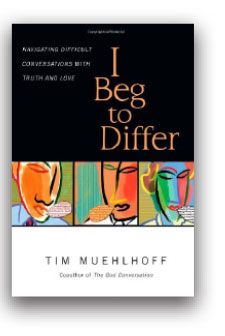I Beg to Differ: Navigating Difficult Conversations with Truth and Love
Tim Muehlhoff
InterVarsity Press
As a young pastor who also wrestles with being a people-pleasing introvert, I wish I had stumbled upon the contents of this book a long time ago; it could have saved a lot of headaches and angst.
Tough conversations with people are inevitable and our Christian life is no exception. Scripture calls us to “speak the truth in love” (Ephesians 4:15) and to be mindful of our words because “the tongue has the power of life and death” (Proverbs 18:21), but how do we put these scriptural mandates into practice in our everyday lives in a way that is full of grace and truth?
Balance of theory and practice
In his book, I Beg to Differ, Tim Muehlhoff provides an edifying foundation for navigating life’s difficult conversations. Balanced with a healthy dosage of theoretical and practical insight into speech, communication and word choice, Muehlhoff peppers his book with solid scriptural support, realistic life examples and illustrations and insight from some of the leading scholars in the field of communication.
As one who received a PhD in communication and now teaches the topic at Biola University, Muehlhoff is well suited to understand the dynamics and challenges that go into communicating with those who might disagree with us.
Especially helpful for me was the section where he walks his readers through scenarios plucked from real life:
- How should a spouse talk about budget concerns without provoking the other?
- Can a Christian share Christ with a co-worker of a different religion without causing a rift in the workplace?
- How can a parent confront their child about overdependence on social media?
Muehlhoff does an excellent job walking the reader through these conversations.
Recently, I put his tools to work. At a dinner party, an old friend said, “How’s it going, preacher…asked the atheist!” I laughed it off at first, but later that evening, I was able to have a one-on-one conversation about what he really believed. Remembering what I had read in this book, I focused on the tools needed to be an empathetic listener, to seek common ground and to listen to the Holy Spirit’s prompting to ask questions of significance and relevance.
A church about people
When I worked as a barista at Starbucks, it was pounded into our heads that Starbucks is not in the coffee business serving people. Rather, they are in the people business serving coffee. In an even more profound way, the church is not in the program business or the real estate and building business. Rather, the church is about people. Jesus isn’t obsessed with programs or places, he so loves his people that he was willing to die for them.
As servants and under-shepherds in Christ’s church, we are all called to love others and point them toward Jesus. Often times, this means having difficult conversations with people in our flock. It might look like telling someone to end a difficult relationship. Or calling out an unhealthy behaviour in a sister or brother in Christ.
Whatever it is, there are two truths that this book has sobered me to consider: difficult conversations are inevitable, and the distance between my heart and my mouth is often too great for me to find the right words to speak the truth in love.
As I was teaching my young adult group about our MB distinctive of peacemaking, love and nonresistance, they raised the stereotype that, because we are Anabaptists, not only do we avoid bearing arms in wars, but we should also avoid any conflict in any situation. No confronting a brother or sister.
This misconception could not be further from the truth. As evangelical Anabaptists, we take very seriously Paul’s charge to us in 2 Corinthians 5: we are called to a ministry of reconciliation between people’s relationships with God and people’s relationships with each other!
Indeed, our MB Confession of Faith reflects this: “We believe that God in Christ reconciles people to himself and to one another, making peace through the cross. We seek to be agents of reconciliation, practise love of enemies, and express Christ’s love by alleviating suffering, reducing strife and promoting justice.”
Muehlhoff`s book strengthens our ability and sharpens our focus to be God`s agents of reconciliation in a broken and fragmented world.
Whether we have been following Jesus for decades or just starting out, whether we are charismatic extroverts or quiet introverts, there is much in this book for all of us to learn and to put into practice in our Christian lives. Difficult conversations will continue to be inevitable; however, I Beg to Differ has given me confidence and tools to navigate them with a spirit of power, of love and of a sound mind (2 Timothy 1:7).
Kevin Carrigan is pastor of young adults and worship at Culloden Church, Vancouver.
